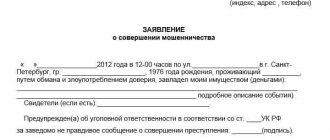Before sending an application to the prosecutor's office, you need to figure out when and how to do this as simply as possible. This is usually done if a person's rights are violated, causing him to suffer. In addition, the law must be broken. Then law enforcement agencies can take action. A complaint to the prosecutor's office initiates a serious investigation, therefore, when the prosecutor's office intervenes, everyone is wary - from officials and people holding senior positions in enterprises to ordinary sellers. There are several ways to file a complaint, including online, so a person doesn’t even need to leave home. Despite the ease of submitting an online document, first you need to compile it correctly. Only in this case will the treatment achieve the desired effect.
Who can you file a complaint against with the prosecutor's office?
Anyone can file a complaint with the prosecutor's office, the main thing is that there are grounds for this. The main reason is violation of the law . If the complaint contains information about a violation of current legislation, the prosecutor's office is obliged to consider it. That is why when drawing up a document it is so important to be precise - to indicate specific information.
For convenience, we can highlight several of the most popular types of complaints that are written to the prosecutor’s office:
- For persons who manage commercial and non-commercial enterprises, public organizations, etc.
- On bailiffs (their actions or inactions) as well as other officials (tax inspector, city/district administration employees, etc.).
- On employers who believe that they can not comply with labor legislation (not pay wages, illegally fire).
- Developers who fail to comply with the terms of the DDU, do not comply with the requirements of the DDU, and do not respond to complaints.
- On the management company and resource supply enterprises for not fulfilling their duties.
- For sellers, manufacturers, people who provide paid services. If they violate consumer rights.
But there are restrictions - the prosecutor’s office does not work with individuals. If an individual violates the law, depending on the nature of the offense, you need to contact other law enforcement agencies. But if these bodies are inactive, then you can go to the prosecutor’s office.
Preparation of evidence
Particular attention should be paid to the preparation of evidence confirming the fact of violation of rights by the property owner. A list of violations by housing and communal services should be compiled in advance, and the violation should be supported by a reference to the violated legal norms. It would be a good idea to contact a lawyer who will help identify violations and indicate which documents will be evidence of violations.
Not only witness statements, but also other documents can be used as evidence. An agreement with housing and communal services and receipts with incorrect calculations will be enough to bring violators to justice. The prosecutor's office will check the data in the receipts for compliance with the internal documentation of the organization, and if violations are identified, they will demand that they be eliminated.
If the basis for the appeal is repairs and overestimation of its cost, then an estimate should be provided as evidence, which can be requested from the company that carried out the repairs. Identification of inconsistencies in the estimate and inflated cost of repairs will be grounds for initiating a criminal case.
Requirements for an application to the prosecutor's office
In order for an application to be accepted by the prosecutor's office, the sample (correct) must meet the standard. Even if it's an online document. Although the law does not have any special requirements for the contents of the document, it must contain certain information:
- The name of the body where the correct sample application to the prosecutor's office is submitted. As an alternative, you can indicate in the sample the name of the person who will be involved in your case.
- Who sends application samples? Sender's full name and address. If you want to receive an answer to another, correct residential address, you must also indicate it when drawing up the sample.
- State the essence of the issue as fully as possible. But without too much specificity, so as not to overload the sample document.
- Date of submission of the sample and signature of the person sending this application.
A correct application to the prosecutor's office is written and submitted according to a certain algorithm. The most attention is paid to the part where the applicant must write the essence of his complaint. In this part, the prosecutor's office draws attention to the events that preceded the offense. Also indicate the exact date when you contacted government agencies, when you entered into an agreement, when you began your employment relationship, etc.
Next, be sure to indicate what the dispute was and under what circumstances the law was violated. Describe what exactly happened - how the law was broken. It indicates which law was violated. If there is already a decision that violates the law, enter its details.
Next you indicate what you require from the authorities. For example, you can demand that an unscheduled inspection be carried out at the body that violated the law. It wouldn’t hurt to indicate in the sample that you demand that those responsible be brought to justice.
The form in which the complaint is made is free. This is what a sample complaint to the prosecutor’s office looks like:
Housing and communal services functions
- Inspection of residential buildings (including a complete inspection of the housing stock) and preparation of design and estimate documentation (regardless of the period of repair work).
- Repair and construction work on the replacement, restoration or replacement of elements of residential buildings (except for the complete replacement of stone and concrete foundations, load-bearing walls and frames).
- Modernization of residential buildings during their major renovation (redevelopment taking into account the disaggregation of multi-room apartments; installation of additional kitchens and sanitary units, expansion of living space due to auxiliary premises, improvement of insolation of residential premises, elimination of dark kitchens and entrances to apartments through kitchens with devices, if necessary, built-in or attached premises for staircases, sanitary facilities or kitchens); replacement of stove heating with central heating with the installation of boiler rooms, heat pipelines and heating points; rooftop and other autonomous heat supply sources; refurbishment of furnaces to burn gas or coal; equipment with cold and hot water supply systems, sewerage, gas supply with connection to existing main networks at a distance from the input to the connection point to the main lines up to 150 m, installation of gas ducts, water pumps, boiler rooms; complete replacement of existing central heating systems, hot and cold water supply (including the mandatory use of modernized heating devices and pipelines made of plastic, metal-plastic, etc. and a ban on the installation of steel pipes); installation of household electric stoves instead of gas stoves or kitchen fires; installation of elevators, garbage chutes, pneumatic garbage removal systems in houses with the upper floor landing level of 15 m and above; transfer of the existing power supply network to higher voltage; repair of television antennas for collective use, connection to telephone and radio broadcasting networks; installation of intercoms, electric locks, installation of automatic fire protection and smoke removal systems; automation and dispatching of elevators, heating boiler houses, heating networks, engineering equipment; improvement of courtyard areas (paving, asphalting, landscaping, installation of fences, wood sheds, equipment for children's and utility areas). Repair of roofs, facades, joints of prefabricated buildings up to 50%.
- Insulation of residential buildings (work to improve the heat-insulating properties of enclosing structures, installation of window fillings with triple glazing, installation of external vestibules).
- Replacement of intra-block utility networks.
- Installation of meters for metering thermal energy consumption for heating and hot water supply, cold and hot water consumption for the building, as well as installation of apartment meters for hot and cold water (when replacing networks).
- Reconstruction of unventilated combined roofs.
- Design supervision of design organizations for major repairs of residential buildings with full or partial replacement of floors and redevelopment.
- Technical supervision in cases where local governments and organizations have established units for technical supervision of major repairs of housing stock.
- Repair of built-in premises in buildings.
Owners must pay. How and for what exactly is decided at the general meeting.
Collective complaint to the prosecutor's office
Before writing an application to the prosecutor's office, you should take into account that the correct document can be not only individual, but also collective. Drawing up a collective complaint is not much different from an individual document. The difference is that one person acts as an applicant, and if a collective one is written, there may be several applicants.
Typically, such complaint formats are drawn up if several people were affected or if the decision to write a complaint was made at meetings, rallies, etc. Several applicants can sign a collectively written application. So a collective complaint has only a few differences - it is drawn up by more than two people and several people can sign it.
List of attached documents
As we have already said, in order to substantiate the requirements, it is necessary to collect evidence of unlawful actions on the part of housing and communal services employees. The desired result can be achieved if you provide the following documents:
- Technical passport of the apartment (for all apartments when filing a collective complaint);
- Agreement for the provision of utilities;
- Confirmation of ownership of the applicant’s apartment;
- Copies of receipts confirming payment of utility services;
- A copy of the claim sent to the head of the housing and communal services as evidence of attempts made to resolve the issue;
- Housing and communal services response to the submitted claim (if any).
Submit an anonymous application
The main requirement for how to correctly write an application to the prosecutor’s office is to indicate the name and address of the applicant, so it will not be possible to submit a document anonymously if you want to receive a response from government agencies. If you try to send even a truthful and correctly completed complaint, but without the applicant’s full name and address, the prosecutor’s office will consider the document, but there will be no response.
Thus, although the law does not prohibit sending anonymous complaint samples, and they may serve as the basis for an extraordinary inspection, the prosecutor’s office will not respond to the document. So the applicant will not know whether measures were taken or whether the authorities were inactive. This is logical, because if the complaint is anonymous, it is not known where to send the response.
Sample complaint
The legislation does not establish a single form for completing an application.
But the complaint sample must contain the following information:
- name of the organization to which the document is submitted;
- personal data of the applicant;
- a brief description of violations with links to legislative acts;
- requirements;
- list of applications;
- date of compilation and signature.
An example of a complaint can be viewed here. If the complaint is collective, then the signatures of all applicants must be collected.
Download a sample complaint to the housing inspectorate for housing and communal services
Download a sample complaint to Rospotrebnadzor regarding housing and communal services
Download a sample complaint to the prosecutor's office for housing and communal services
Download a sample statement of claim to the court for housing and communal services
The following documents can be attached to the application:
- examination results;
- copies of appeals to other authorities and responses from them;
- receipts for payment of housing and communal services;
- photo and video materials.
When applying via an online form , the size of attached applications should not exceed 5 MB.
How to submit an application to the prosecutor's office
Another pressing question is how to submit an application to the prosecutor’s office? There are several current ways to submit applications after you have been able to write them:
In writing
A written complaint can be submitted by any convenient method. For example, bring it to the prosecutor's office, send it by registered mail. But if you use postal delivery, be sure to choose the method with delivery receipt.
Orally
The format of the appeal under consideration can be used in a personal meeting with a representative of the prosecutor’s office in the performance of his duties. You can also call the hotline or contact using the media as intermediaries.
Electronic means of communication - online
An online application to the prosecutor's office can be submitted directly on the website of the local prosecutor's office, although you can contact the regional office. There are specialized forms on the online platform - you just need to fill them out. Although you can do it easier - send the document by official email.
Decide for yourself how to submit an application to the prosecutor’s office, because each method has its pros and cons. But if you send documents online, it will take less time and require minimal effort.
Procedure and terms for consideration of a complaint
The prosecutor's office must register the complaint after receiving it within three days from the date of receipt. But only if the document meets all the requirements that are accepted in relation to the application under consideration. When the sample is registered, it is submitted to the prosecutor, who will henceforth be responsible for it.
The prosecutor must carry out a set of activities, considering the complaint and trying to determine whether there are grounds for it and how correctly it is drawn up:
- It is checked whether all the facts specified in the complaint are true. He may even go to the scene to establish prosecutorial control.
- Collect and request the documentary base necessary to make a decision. For example, it will require the provision of materials from a criminal case, enforcement proceedings, etc. This will help you look at the situation objectively.
- He will transfer some of his responsibilities to lower-level prosecutors in order to check the complaint in more detail.
- Can submit materials to various authorities in order to initiate criminal or administrative proceedings.
The prosecutor can also grant or deny (do not act) the request to fire someone specified in the sample complaint.
The complaint received by the prosecutor's office has its own consideration period. For ordinary cases they are 15 days. If the case requires additional verification, the prosecutor's office can work for 30 days. Sometimes the deadline for a complaint is extended, but not longer than another 30 days. When the review is completed, representatives of the prosecutor's office provide a response, reporting on the work done and measures taken.
Application to the prosecutor's office unanswered
Usually, if an application is submitted to the prosecutor's office for inaction or some other problem, the applicant waits for a response. But it will not follow in the following cases:
- If the applicant did not indicate his full name and address on the complaint sample;
- There is no information in the complaint to resolve it;
- The document has no substance;
- The applicant is trying to independently interfere with the work of the prosecutor's office;
- The text of the complaint is unreadable and illegible;
- The text contains obscene language and threats.
Without a response, the prosecutor's office will leave sample applications asking for actions that are not within its competence. If the document needs to be redirected, the applicant is additionally notified of the event in question. Moreover, there is no need to be confused - if a complaint is not answered, this does not mean that it is not being dealt with. But if the complaint is not satisfied, then the offense cannot be proven or it did not exist at all.
You can get legal assistance on how to file a complaint with the prosecutor’s office on our website.









